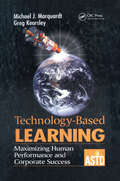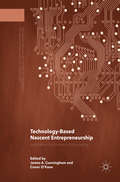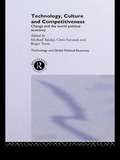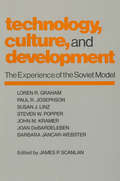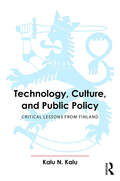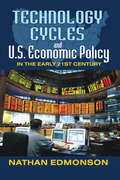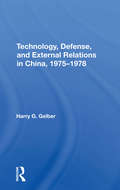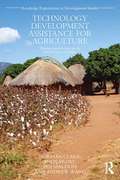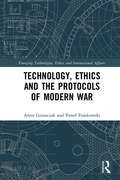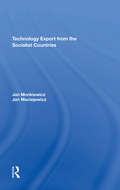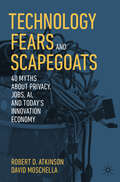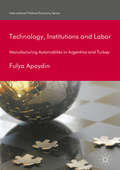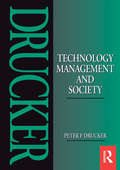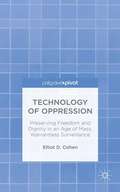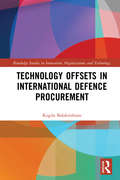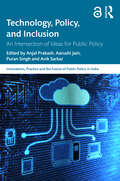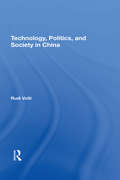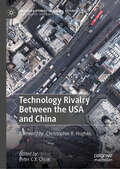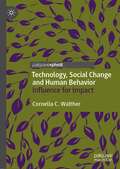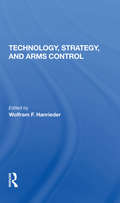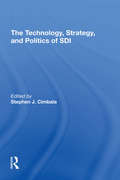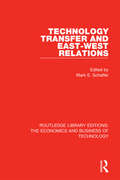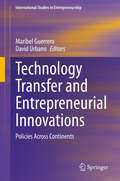- Table View
- List View
Technology-Based Learning: Maximizing Human Performance and Corporate Success
by Michael J. Marquardt Greg KearsleyCompanies worldwide are recognizing the critical importance of harnessing the learning capabilities of people and technology in the workplace. Technology-Based Learning:Maximizing Human Performance and Corporate Success shows how to capture and leverage this power, through techniques of knowledge management.This comprehensive overview examines the advantages and disadvantages of learning technologies, and provides a guide for selecting, costing, and applying the various techniques.Technology in the workplace has many overwhelming possibilities-so many that they've left many managers and HRD professionals confused and perplexed. Let Marquardt and Kearsley show you how to bring technology under control to meet the needs of your company and your employees.
Technology-Based Nascent Entrepreneurship
by James A. Cunningham Conor O’kaneThis edited volume presents new means of quantifying the behavioral and consequential differences between technology-based and non-technology-based nascent entrepreneurs in varied economies. It explores the socioeconomic place of technology in developed and developing countries, and describes the implications of this research for policymakers' ability to identify and support new areas of economic growth. This book also examines technology-based nascent entrepreneurship issues in the context of entrepreneurial leadership, business incubation, ethnic migrants, university researchers, new venture formation activities, student entrepreneurship, and start-up competitions. The contributors to this collection provide valuable insights for the growing study of and expanding policies addressing nascent entrepreneurship.
Technology, Culture and Competitiveness: Change and the World Political Economy (Technology and the Global Political Economy)
by Michael Talalay Chris Farrands Roger ToozeThe first volume in a major new series, this book will be an essential read for all those who need to deal with the causes and consequences of rapid technological change in an increasingly globalized world, whether they be government policy-makers, managers of multi-national corporations, commentators on the international scene or specialists in and students of international politics, economics and business studies.The authors discuss three related areas:* How do we think about technology and international relations/international political economy? How does technology relate to competitiveness? How does it inlfuence our culture and how is it influenced by it?* In what sense is technology a fundamental component of national competitive advantage and what ought national, local and corporate policy to be in the light of this?* What is the relationship between technological innovation and global political and economic change?Technology is discussed not just in an instrumental sense - as a tool of power and an object of policy - but equally in a transcendental sense - as a key to shaping and structuring how we understand and interpret reality.The final section of the book presents case studies of three core sectors of the world political economy, finance , aviation and automobiles.
Technology, Culture and Development: The Experience of the Soviet Model
by James P. ScanlanAlthough scholars have devoted much attention to the impact of technology on society, they have tended to slight the question of how technology is affected by social systems. The authors of this volume take precisely this approach in their examination of the "Soviet model" of development. The book surveys the history and current state of science and technology in the USSR and its former satellites. It then looks at the economic environment for technological innovation and examines the impact of the "energy shock" in the transitional economies of the region. Finally, it discusses the ecological devastation of the USSR and Eastern Europe, its connection with the "Soviet model" and the prospects for remediation. The central argument of the book is that the cultural and social factors and the legacy of the Soviet model will inevitable figure in the reconstruction of the East.
Technology, Culture, and Public Policy: Critical Lessons from Finland
by Kalu KaluIn a relatively short time, Finland has transformed a society of approximately 5.3 million people into one of the most educated and technologically sophisticated in the world, while maintaining relative political stability and an enviable quality of life among its people. In all comparative measures of international achievement, Finland ranks at the top among the world’s most literate and wealthiest countries. How did Finland do it, and what can other countries learn from the Finnish example?This book presents an energized and informative look at Finland’s cultural and developmental history, its political evolution as a state, the foundation and origins of its technology and innovation policy, and present developments in health care, education, and the pathway to sustainable economic development. Utilizing both qualitative and quantitative approaches, author Kalu Kalu incorporates rarely-seen archival data alongside analysis of original research surveys disseminated to members of the Finnish national legislature, personnel of the ministries of education and health, administrators in local government jurisdictions, and members of the general public. The result is a book that offers an incisive and analytical account of virtually all aspects of Finnish life – ranging from culture, parliamentarianism, arts, architecture, design, literature, education and health policies, information technology, to the development of multipolis technology clusters and networks. Demonstrating how civic attitudes have evolved over time mediated by the pressures of technology and modernity, Technology, Culture, and Public Policy ultimately transcends an examination of Finland’s own successes and challenges, considering what lessons other countries might apply to their own intricate national contexts.
Technology, Culture, and Public Policy: Critical Lessons from Finland
by Kalu N. KaluIn a relatively short time, Finland has transformed a society of approximately 5.3 million people into one of the most educated and technologically sophisticated in the world, while maintaining relative political stability and an enviable quality of life among its people. In all comparative measures of international achievement, Finland ranks at the top among the world’s most literate and wealthiest countries. How did Finland do it, and what can other countries learn from the Finnish example? This book presents an energized and informative look at Finland’s cultural and developmental history, its political evolution as a state, the foundation and origins of its technology and innovation policy, and present developments in health care, education, and the pathway to sustainable economic development. Utilizing both qualitative and quantitative approaches, author Kalu Kalu incorporates rarely-seen archival data alongside analysis of original research surveys disseminated to members of the Finnish national legislature, personnel of the ministries of education and health, administrators in local government jurisdictions, and members of the general public. The result is a book that offers an incisive and analytical account of virtually all aspects of Finnish life – ranging from culture, parliamentarianism, arts, architecture, design, literature, education and health policies, information technology, to the development of multipolis technology clusters and networks. Demonstrating how civic attitudes have evolved over time mediated by the pressures of technology and modernity, Technology, Culture, and Public Policy ultimately transcends an examination of Finland’s own successes and challenges, considering what lessons other countries might apply to their own intricate national contexts.
Technology Cycles and U.S. Economic Policy in the Early 21st Century
by Nathan EdmonsonThe overarching theme of this volume is the cyclical nature of technological change, its impact on economic growth, and the limits of government intervention. Technological revolutions are infrequent; there were only three in all of the twentieth century. When they occur, their possibilities are often not immediately apparent. Technology revolutions induce capital investment, not just because they stimulate the need to acquire the new technology, but also because of the need to replace obsolete capacity and new infrastructure. While government has encouraged general economic progress by carrying out highly risky innovations unrelated to fostering economic growth, it seldom succeeds with specific efforts to foster growth. Recent examples of success include the Internet and the global positioning system (GPS), which trace their origins to defense-related research. In contrast, the countercyclical economic stimuli of 2007-2009 have achieved little in the way of general growth. The lack of data about the technology cycle makes formulating appropriate monetary and other policy countercyclical interventions difficult. A technology-founded upswing animated the American economy after 1990, and the -great recession- of 2007- 2009 reflected the waning of the investment boom that this revolution generated. Edmonson argues that the impact of technology revolutions on general economic growth has never received the attention it deserves. This volume will contribute much to debates on economic policy.
Technology, Defense, And External Relations In China, 1975-1978
by Harry G. GelberThis volume surveys efforts by China's post-Mao leadership to adopt modern technology in China's industrial and economic sectors while focusing new attention on an increasingly obsolescent defense structure. The author presents these efforts against the background of the external political and military environment to which the PRC must react. He outlines the foreign policy and strategic problems that faced the new administration as it came to power in Peking and examines the military, industrial, and technical resources currently at China's disposal as well as changes that have been proposed, implemented, or that may be required in the future. Finally, he suggests some of the limitations circumscribing government policy in these areas and some of the choices that lie ahead.
Technology Development Assistance for Agriculture: Putting research into use in low income countries (Routledge Explorations in Development Studies)
by Norman Clark Andy Frost Ian Maudlin Andrew WardStemming from an 11-year DFID funded programme under its Renewable Natural Resources Research Strategy (RNRRS), Technology Development Assistance for Agriculture: Putting Research into Low Income Countries reviews part of this programme as a case study of a broader issue of technology development for Africa. Controversially, it critiques current international technology development assistance and focuses on the potential role of the private sector in agricultural technology development as well as providing insights for future cognate science policy and practice. The book focuses on the RIU "Best Bets" Africa sub-programme. This identified promising proposals to take existing agriculture research products and put these into use in ways that would benefit the poor in developing countries. The sum set aside for this was £5 million. The empirical sections of the book cover project selection, progress and programme management over a 2009-2012 period with special attention paid to lessons learned that may have implications for future cognate technology development assistance. This topical book gives direct evidence of meeting objectives and delivering real changes in technology development for Africa to postgraduate students, researchers, international bodies, NGOs, policy makers and government organisations working on natural resource management, technology development assistance, and low income country agriculture.
Technology, Ethics and the Protocols of Modern War (Emerging Technologies, Ethics and International Affairs)
by Artur Gruszczak Pawel FrankowskiContemporary security has expanded its meaning, content and structure in response to globalisation and the emergence of greatly improved world-wide communication. The protocols of modern warfare, including targeted killing, enhanced interrogations, mass electronic surveillance and the virtualisation of war have changed the moral landscape and brought diverse new interactions with politics, law, religion, ethics and technology. This book addresses how and why the nature of security has changed and what this means for the security actors involved and the wider society. Offering a crossdisciplinary perspective on concepts, meanings and categories of security, the book brings together scholars and experts from a range of disciplines including political, military studies and security studies, political economy and international relations. Contributors reflect upon new communication methods, postmodern concepts of warfare, technological determinants and cultural preferences to provide new theoretical and analytical insights into a changing security environment and the protocols of war in the 21st century. A useful text for scholars and students of security studies, international relations, global governance, international law and ethics, foreign policy, comparative studies and contemporary world history.
Technology Export From The Socialist Countries
by Jan Monkiewicz Jan MaciejewiczOnly since the 1970s have the East European Socialist countries (known collectively as Comecon) participated in the international exchange of technology as exporters. In this book, Drs. Monkiewicz and Maciejewicz analyze the technology export performance of the Comecon countries. They begin by defining the nature of technology as a commodity, analyzing the structural characteristics of the international market, and outlining both the cost and benefits of technology export. Later chapters provide an overview of Comecon technological policies in the 1970s, with particular attention to the export-import factor and Comecon regional technological cooperation. In-depth analysis is presented through case studies of the experiences of Poland and Czechoslovakia. The book concludes with a discussion of the implications of technology export by socialist countries, particularly its potential impact on existing global patterns of technological dependence and domination.
Technology Fears and Scapegoats: 40 Myths About Privacy, Jobs, AI, and Today’s Innovation Economy
by Robert D. Atkinson David MoschellaTechnologies and tech companies are routinely accused of creating many societal problems. This book exposes these charges as mostly myths, falsehoods, and exaggerations. Technology Fears and Scapegoats debunks 40 widespread myths about Big Tech, Big Data, AI, privacy, trust, polarization, automation, and similar fears, while exposing the scapegoating behind these complaints. The result is a balanced and positive view of the societal impact of technology thus far. The book takes readers through the steps and mindset necessary to restore the West’s belief in technological progress. Each individual chapter provides a cogent and often controversial rebuttal to a common tech accusation. The resulting text will inspire conversations among tech insiders, policymakers, and the general public alike.
Technology, Institutions and Labor: Manufacturing Automobiles In Argentina And Turkey (International Political Economy Ser)
by Fulya ApaydinIn this book Fulya Apaydin argues that labor responses to dramatic technological change are influenced by the political institutions of the Global South more than any other factor. In addressing vocational education programs – which are highly relevant in understanding how labor unrest is governed in developing settings – she makes two important contributions. Firstly, she offers a new theoretical framework to understand labor mobilization and de-mobilization patterns, rethinking vocational education as a key transmission belt for manufacturing labor consent. Secondly, she provides a systematic comparison of skill formation schemes and their implications on labor mobilization in federal and unitary systems. With a focus on Argentina and Turkey, two case studies are provided in which technology has provoked differing levels of strikes, walkouts and extended protest.
Technology, Management and Society
by Peter DruckerIn this volume Drucker has collected twelve essays on technology and management and their relationship to, and interaction with, human society. In these essays the reader is able to grasp and savour some of the essential ideas and philosophy that have been expanded into Drucker's various books. In this volume Drucker has collected twelve essays on technology and management and their relationship to, and interaction with, human society. In these essays the reader is able to grasp and savour some of the essential ideas and philosophy that have been expanded into Drucker's various books.
Technology of Oppression: Preserving Freedom and Dignity in an Age of Mass, Warrantless Surveillance
by Elliot D. CohenIn the wake of the National Security Agency expose of 2013, scholars and citizens alike have been turning a critical eye toward United States surveillance policies. Technology of Oppression contributes to this ongoing discussion with a systematic analysis of mass surveillance in America and allied countries, detailing how lax intelligence laws have allowed these technologies to undermine common civil liberties. Toward the practical end of reigning in existing surveillance technologies, Cohen offers a concise proposal listing the policy changes and software developments necessary to establish an internet-based, global forum for transparently affecting legal and technological change. "
Technology Offsets in International Defence Procurement (Routledge Studies in Innovation, Organizations and Technology)
by Kogila BalakrishnanTechnology offsets, a nonconventional international trade-financing tool, is used by governments (buyers) to obtain industrial and technological benefits from companies (sellers) as part of international procurement. Offsets deals involve billions of dollars and this practice exists in around 80 countries around the world. Though offsets is a popular practice in defence, it is increasingly gaining popularity in civil sectors. Offsets is often tainted by controversy and receives bad press. What then makes offsets popular? Governments claim that offsets delivers technology and knowledge transfer, skills in high technology sectors and employment, and offsets expands export opportunities through participation in OEM supply chains. For companies, offsets is mainly employed as a tool to obtain a competitive edge and win sales in international business. In the past, there have been mixed results of case studies on the impact of offsets successes and failures. Considering the mismanagement of globalisation, unfair trade agreements and current political and economic discontent, there is a stronger need for governments and companies to use vehicles such as offsets to create a relationship of trust and commitment for sustainable development. This book fills the gap in offsets and focuses on how to manage offsets more effectively by addressing issues of strategy, policy and implementation, technology management, governance and risk. Technology Offsets in International Defence Procurement is designed for those studying international procurement, international trade, international business, technology management, defence policy and industrial policy. This book will also be of interest to practitioners and policy makers in both government and industry.
Technology, Policy, and Inclusion: An Intersection of Ideas for Public Policy (Innovations, Practice and the Future of Public Policy in India)
by Anjal Prakash, Aarushi Jain, Puran Singh, and Avik SarkarTechnology, Policy, and Inclusion looks at the intersections between public policy and technology in India. It explores the barriers in instituting effective governance and development and examines how these can be mitigated through technological interventions in developing countries. Increased digitisation of the economy has added to the development challenges in India and issues such as exclusion and social inequality. This volume stresses the need for governments to leverage technology to bring more vulnerable and marginalised groups into the fold of financial and social inclusion. It also focuses on the importance of regulation for a responsible integration of technologies and minimising risks. The book includes examples and case studies from different areas including management of the COVID-19 pandemic through digital means, real estate digital infrastructure, digital census, e-markets for farmers, and government interventions that use technology to deliver financial services in remote areas of the country. It also outlines various solutions for fostering equity and socio-economic development. Part of the Innovations, Practice and the Future of Public Policy in India series, this volume will be of interest to students and researchers of public policy, political science, development studies, and sociology as well as policy professionals and technocrats. This book is freely available as a downloadable Open Access PDF at http://www.taylorfrancis.com under a Creative Commons (CC-BY-NC-ND) 4.0 license.
Technology, Policy, Law, and Ethics Regarding U.S. Acquisition and Use of Cyberattack Capabilities
by National Research Council of the National AcademiesThe United States is increasingly dependent on information and information technology for both civilian and military purposes, as are many other nations. Although there is a substantial literature on the potential impact of a cyberattack on the societal infrastructure of the United States, little has been written about the use of cyberattack as an instrument of U.S. policy. Cyberattacks--actions intended to damage adversary computer systems or networks--can be used for a variety of military purposes. But they also have application to certain missions of the intelligence community, such as covert action. They may be useful for certain domestic law enforcement purposes, and some analysts believe that they might be useful for certain private sector entities who are themselves under cyberattack. This report considers all of these applications from an integrated perspective that ties together technology, policy, legal, and ethical issues. Focusing on the use of cyberattack as an instrument of U.S. national policy, Technology, Policy, Law and Ethics Regarding U.S. Acquisition and Use of Cyberattack Capabilities explores important characteristics of cyberattack. It describes the current international and domestic legal structure as it might apply to cyberattack, and considers analogies to other domains of conflict to develop relevant insights. Of special interest to the military, intelligence, law enforcement, and homeland security communities, this report is also an essential point of departure for nongovernmental researchers interested in this rarely discussed topic.
Technology, Politics, And Society In China
by Rudi VoltiThis study is the first to summarize the major technological policies implemented in China since 1949 and to place them in their social and historical context. Dr. Volti looks at technological change in China as part of a broader process of economic, political, cultural, and organizational change, focusing primarily on four key areas—agriculture, energy, ground transportation, and medicine and public health. He emphasizes how technological change has been shaped by political and ideological structures, notes how China’s unique cultural heritage has affected adoption of technologies developed outside China, and assesses China’s success in developing technologies appropriate to its specific needs as an economically and politically developing nation. He draws on interviews with technicians engaged in the transfer of technology to China as well as extensive primary source materials.
Technology Rivalry Between the USA and China (Palgrave Studies in Global Security)
by Peter C.Y. ChowThis book addresses the geopolitics and geoeconomics of technological rivalry between the world’s two great powers: the USA and China. It focuses on the semiconductor industry, which, owing to its dual use in civilian and defence sectors, is critical to economic and national security interests. A diverse set of contributions from renowned scholars span wide-ranging topics to holistically analyze contemporary USA-China national security through a technological lens: the shifting trade and technology policy in the USA; the Chip-4 alliance as an industrial cartel; technology sanctions and the voice of high-tech industry in the USA; the race for digital sovereignty in the Gulf region and in Africa; Japan’s grand strategy vis-à-vis semiconductors; a critical assessment of China’s achievement on its self-sufficiency and effort in reducing its reliance on foreign supplies; the significance and the strategy of Taiwan’s semiconductor in the future, as well as how Taiwan can advance its national security through its status as a powerhouse of semiconductors; Korea’s semiconductor policy in response to international technology rivalry; India’s pursuit of semiconductors; and a close investigation of decoupling and hostility between the two great powers.
Technology, Social Change and Human Behavior: Influence for Impact
by Cornelia C. WaltherThis book looks at the changing continuum that links individuals, communities and society. An outline of Aspirational Algorithms (AA) and Valuable Wearables is presented as tools to shift from an AI culture to the cultivation of Augmented Humanity (AH). The human mindset that is behind the design and use of technology determines the outcomes of technology. If the intended outcome is the common good, then the preceding human aspiration must be geared toward that goal. Only technology that is conceived with the aspiration of a society that lifts individuals to fulfill their potential can be a game-changer for good. Seeing the constant interplay between the four levels of human existence – soul, heart, mind, body, expressed as aspirations, emotions, thoughts and sensations, how technology may serve to systematically sway individuals from inspiration to desire, from informing to the ignition of tangible transformation. This transition is explained in the book along the scale of influence. Two convergent and mutually influencing dynamics are analyzed: first, the influence of values and aspirations on the impact of technology, and second, the influence of technology on the attitude and action of users. Both assess how hardware and software can serve a maximum of people to live a meaningful happy life.
Technology, Strategy, And Arms Control
by Wolfram F HanriederFocusing on the most urgent issues of arms control, this collection of essays discusses the East-West military balance, the nature of U.S.-Soviet relations, the political dynamics of developments in weapons technology, the problems that conflicting national security policies pose for the management of the Western alliance, the influence of U.S. dom
The Technology, Strategy, And Politics Of Sdi
by Stephen J CimbalaThe Strategic Defense Initiative (SDI) to develop a ballistic missile defense (BMD) system has both short-range and long-range risks as well as potential benefits. For the most part, however, strategic, technological, and political issues relevant to SDI have been analyzed in isolation from one another. This book provides a more inclusive framework for assessing the possible development and deployment of a BMD system by the United States or the Soviet Union. Contributors discuss the risks for arms race stability, probable reactions of the Soviet Union to any U.S. space-based defense system, and implications for the stability of extended deterrence commitments to NATO European allies. They also evaluate Soviet research and development programs in missile defense that must be considered in any extrapolation of the requirements for U.S. deterrence in the next several decades.
Technology Transfer and East-West Relations (Routledge Library Editions: The Economics and Business of Technology #45)
by Mark E. SchafferOriginally published in 1985, in the deteriorating climate of East-West relations technology transfer became vitally important. The Eastern bloc desperately needed Western technology to assist in the development of the socialist economies, but a proposed US ban on the export of Western technology to the Siberian pipeline project led to increasing tension within the Western alliance abot the nature and scale of high technology that could be safely exported to the East. This book reviews the state of technology transfer to the East in the 1980s and considers the place of Western technology in the Eastern economies. It also discusses the strategic goals of Western technology embargoes. Many of the issues discussed remain pertinent today.
Technology Transfer and Entrepreneurial Innovations: Policies Across Continents (International Studies in Entrepreneurship #51)
by David Urbano Maribel GuerreroEvidence suggests that economies with technology transfer initiatives provide a better supply of high-quality jobs and tend to be characterized by entrepreneurs with higher innovation contributions. This book explores the effectiveness of technology transfer policies and legislation on entrepreneurial innovation in a non-US context. It analyses the theoretical, empirical and managerial implications behind the success of technology transfer polices and legislations in stimulating entrepreneurial innovation; analyses which other contextual condition (e.g., culture) are necessary for successful implementation; and explores the extent and level of replication of US policies (e.g., Bayh-Dole Act, Small Business Innovation Research [SBIR] program) in other national and regional systems. In addition, this book looks at the effect technology transfer policies have on the adoption of open innovation and open science.
